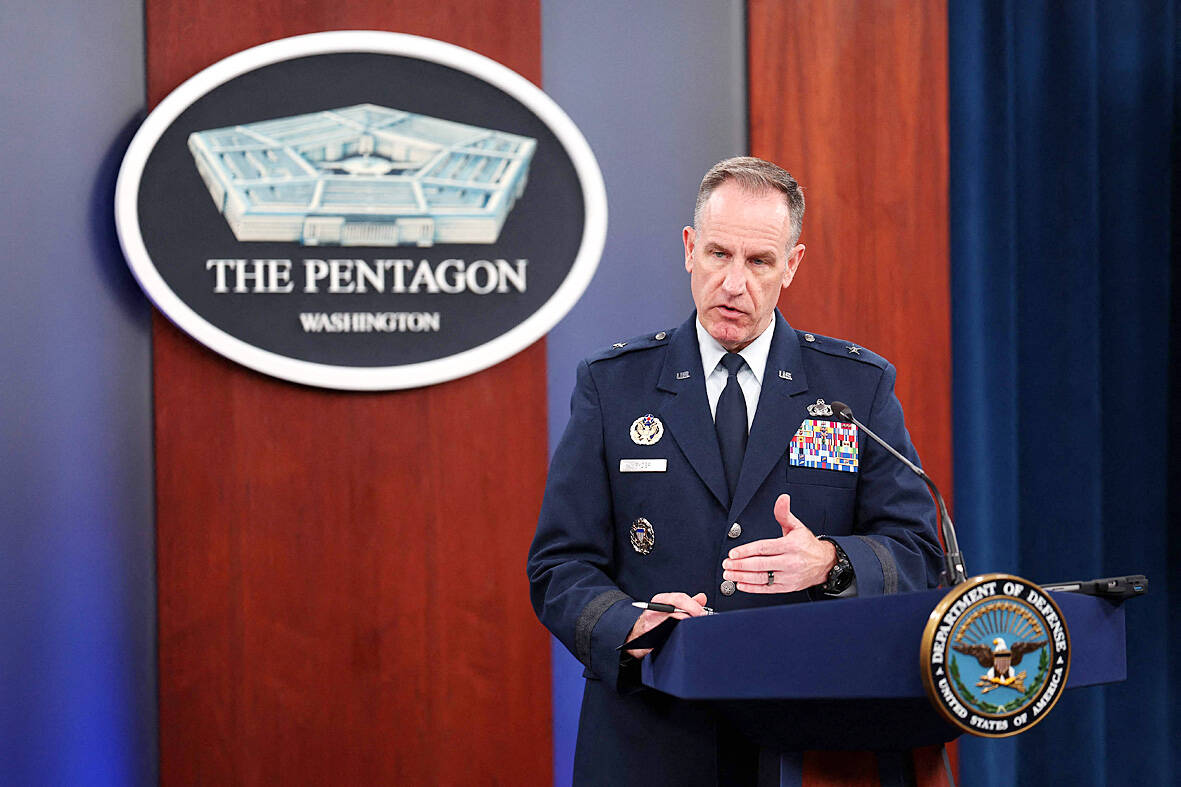The world’s largest military says it’s serious about investigating unexplained objects in America’s skies and will ask service members — and eventually ordinary people — to submit what they think might be alien sightings.
That reporting feature will be included on a new a Web site — www.aaro.mil — that the Pentagon is launching as part of efforts to detail its work to get to the bottom of a slew of incidents in recent years. Those encounters have confounded the national security establishment and provoked accusations that the government is covering up what it knows.
The Web site will document the Defense Department’s unclassified work on what it describes as “unidentified anomalous phenomena” and will offer links to reports, frequently asked questions and other data for alien hunters.

Photo: AFP
It will include a secure way to submit sightings “for consideration and review,” Pentagon spokesman Brigadier General Pat Ryder told reporters Thursday. That feature is aimed at dispelling what some fighter pilots have said was a stigma against reporting what they believe could be encounters with extraterrestrial life.
Initially, only service members and civilian Pentagon employees will be able to submit reports. As for regular Americans?
“That is something that we will look to do in the future but I don’t have an estimate right now in terms of when the public will be able to submit reports,” Ryder said.
Interest in the alien sightings exploded into the mainstream in 2020 when the Pentagon released videos taken by naval aviators that showed unexplained objects flying at high speed and moving in ways that defied explanations. During congressional hearings in July, three former military officers described encounters with what they called high-tech, unexplained flying objects. One accused the US of secretly holding onto extraterrestrial wreckage.
At those hearings, retired Navy commander David Fravor described an encounter with a “white Tic Tac shaped object” during one flight.
“There were no rotors, no rotor wash, or any visible flight control surfaces like wings,” he testified. He said the device maneuvered abruptly, changed direction rapidly and “defied material science.”
Another witness, David Grusch, who has claimed whistleblower status, said he knows of the “exact locations” of some recoveries, which included what he called non-human biological matter.
The US military says it has no evidence that interstellar travelers have visited Earth. But in a further sign of the Pentagon’s seriousness, Ryder said Deputy Defense Secretary Kathleen Hicks has been appointed to lead the team that oversees the tracking and reporting of such unexplained encounters, known as the All-Domain Anomaly Resolution Office.

Every now and then, it’s nice to just point somewhere on a map and head out with no plan. In Taiwan, where convenience reigns, food options are plentiful and people are generally friendly and helpful, this type of trip is that much easier to pull off. One day last November, a spur-of-the-moment day hike in the hills of Chiayi County turned into a surprisingly memorable experience that impressed on me once again how fortunate we all are to call this island home. The scenery I walked through that day — a mix of forest and farms reaching up into the clouds

With one week left until election day, the drama is high in the race for the Chinese Nationalist Party (KMT) chair. The race is still potentially wide open between the three frontrunners. The most accurate poll is done by Apollo Survey & Research Co (艾普羅民調公司), which was conducted a week and a half ago with two-thirds of the respondents party members, who are the only ones eligible to vote. For details on the candidates, check the Oct. 4 edition of this column, “A look at the KMT chair candidates” on page 12. The popular frontrunner was 56-year-old Cheng Li-wun (鄭麗文)

“How China Threatens to Force Taiwan Into a Total Blackout” screamed a Wall Street Journal (WSJ) headline last week, yet another of the endless clickbait examples of the energy threat via blockade that doesn’t exist. Since the headline is recycled, I will recycle the rebuttal: once industrial power demand collapses (there’s a blockade so trade is gone, remember?) “a handful of shops and factories could run for months on coal and renewables, as Ko Yun-ling (柯昀伶) and Chao Chia-wei (趙家緯) pointed out in a piece at Taiwan Insight earlier this year.” Sadly, the existence of these facts will not stop the

Oct. 13 to Oct. 19 When ordered to resign from her teaching position in June 1928 due to her husband’s anti-colonial activities, Lin Shih-hao (林氏好) refused to back down. The next day, she still showed up at Tainan Second Preschool, where she was warned that she would be fired if she didn’t comply. Lin continued to ignore the orders and was eventually let go without severance — even losing her pay for that month. Rather than despairing, she found a non-government job and even joined her husband Lu Ping-ting’s (盧丙丁) non-violent resistance and labor rights movements. When the government’s 1931 crackdown